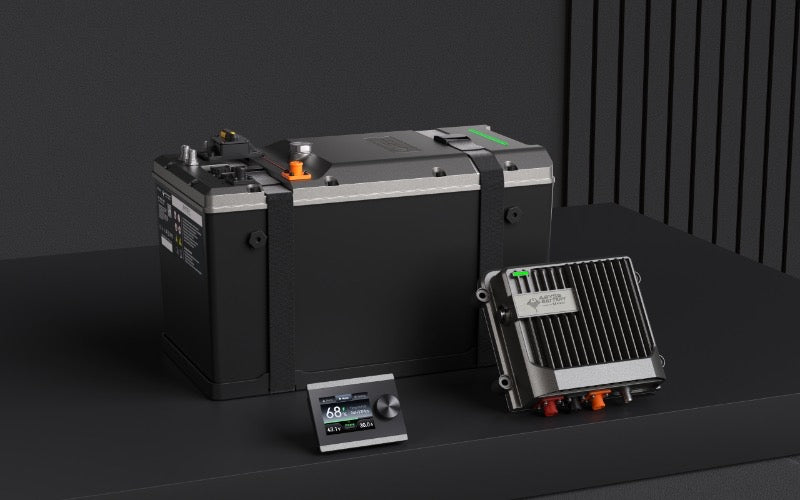Preparing Your Marine Battery for Off-Season Storage

Properly preparing your marine battery for off-season storage is essential for maximizing its lifespan and ensuring your vessel is ready to power your next adventure without delay. This guide walks you through five easy steps for storing your battery with confidence and peace of mind.
How to Store Marine Batteries in Winter
Proper off-season boat battery maintenance is a straightforward process when you follow these steps. Each task is designed to protect your battery, ensure safety, and maximize performance for the next boating season.
1. Remove and Inspect the Battery
Before storing your battery, perform a thorough inspection following these steps:
- Disconnect the battery from all electrical systems, starting with the negative terminal.
- Carefully lift the battery out of its compartment, avoiding any sharp movements.
- Inspect the battery case for cracks, bulges, or leaks.
- Check for signs of corrosion or damage on terminals and cables.
- Replace the battery if you notice any significant damage or wear.
2. Clean and Prepare Terminals
Clean terminals are crucial for optimizing performance and preventing marine battery degradation during storage. Here's how to do it:
- Use a soft brush and a mixture of baking soda and water to clean terminals.
- Dry thoroughly with a clean cloth.
- Apply a specialized anti-corrosion spray or petroleum jelly to terminals.
- Ensure all connections are secure and free from fraying or damage.
3. Charge to Optimal Level
Charging your battery before storage is vital for maintaining its health and readiness. Charging best practices include:
- Fully charge the battery using a charger designed for your battery type.
- Avoid deep discharges—never store a battery at a state of charge below 50%.
- For lithium batteries, charge to between 30 and 50% as recommended by the manufacturer.
- Disconnect the charger once the battery is fully charged to prevent overcharging.
4. Store in a Safe, Climate-Controlled Location
The right storage environment protects your battery from temperature extremes and physical damage. Follow these marine battery storage tips:
- Keep the battery in a cool, dry, and well-ventilated area if you're storing it for over 90 days. The ideal temperature range for lithium marine batteries is 32°F to 68°F (0°C to 20°C).
- Avoid locations prone to freezing, excessive heat, or moisture.
- Place the battery on a nonconductive surface, but avoid placing it directly on concrete.
- Secure the battery to prevent tipping or movement.
- Ensure the storage area is free from flammable materials and direct sunlight.
5. Monitor and Maintain During Storage
Even in storage, periodic checks will keep your battery in top condition. Carry out these off-season boat battery maintenance tasks:
- Use Bluetooth or app-based monitoring if available to check battery status remotely.
- Inspect the battery every one to two months for charge level and physical condition.
- Top off the charge if the battery drops below recommended levels.
- Avoid connecting any devices that could cause parasitic drain.
Safety and Compliance
Follow all manufacturer and regulatory guidelines when storing lithium-ion batteries, including those of the American Boat & Yacht Council (ABYC).
Batteries should be kept in approved, ventilated enclosures or dedicated battery rooms to minimize risks. Only use certified and tested batteries with documented safety features. For added protection, install fire and gas detection systems in storage areas. Finally, conduct regular safety drills and ensure all personnel are trained in battery handling and emergency response procedures.

Environmental Responsibility
Boat battery care during the off-season includes protecting the marine environment you love. Proper storage and maintenance help prevent leaks and contamination, which can introduce harmful chemicals into the water and threaten marine life.
Extending your battery's lifespan through careful off-season care also reduces waste. Fewer replacements mean fewer batteries end up in landfills or recycling centers, minimizing your environmental footprint. This approach saves you money over time and supports a more sustainable boating community. When your battery does reach the end of its life, responsible recycling and disposal are crucial.
Off-Season Marine Battery Storage FAQs
Here are answers to some of the most frequently asked battery storage questions:
- How do I store marine batteries in winter? To store marine batteries in winter, remove them from your boat and keep them in a cool, dry, and well-ventilated location, ideally above freezing temperatures. Fully charge the battery before storage, disconnect any devices, and check periodically to maintain optimal charge and condition.
- Can I leave my battery in the boat over winter? It's not recommended to leave your battery in the boat, as cold temperatures and moisture can cause damage or reduce its lifespan. Removing the battery and storing it in a controlled environment helps maintain its performance and safety.
- How often should I check my battery during storage? Check your battery every one to two months while it's in storage. Regular inspections help you monitor charge levels, spot any signs of corrosion or damage, and ensure the battery remains in optimal condition.
- What if my battery loses charge during storage? If you notice your battery's charge dropping below the recommended levels, recharge it using a compatible charger before reinstalling or using it again. Keeping the battery at the proper charge level prevents deep discharge and extends its lifespan.
- Are lithium batteries safe to store indoors? Yes, it's safe to store lithium batteries indoors if they are kept away from heat sources, direct sunlight, and flammable materials. Always follow manufacturer guidelines for storage and ensure the area is dry and well-ventilated.
- What should I do if I notice corrosion or damage? Clean minor corrosion from terminals with a baking soda solution and a soft brush, then dry thoroughly. If you see significant damage, cracks, or leaks, replace the battery to avoid safety risks.
Understanding Lithium vs. Lead-Acid Marine Batteries
Advanced engineered lithium-iron marine batteries, like those from Abyss Battery®, offer significant advantages over traditional lead-acid batteries. Key differences to consider include:
- Longevity: Lithium batteries can last up to 10 years and over 5,000 cycles, compared to two to three years and 200-300 cycles for flooded lead-acid (FLA) and Absorbent Glass Mat (AGM) batteries.
- Weight and size: Lithium batteries are up to 70% lighter, saving space and improving vessel efficiency.
- Maintenance: Lithium batteries require less maintenance and are less prone to sulfation or acid leaks.
- Storage flexibility: Lithium batteries tolerate deeper discharges and have lower self-discharge rates, making them ideal for long-term storage.
- Advanced features: Integrated BMS and Bluetooth monitoring provide real-time data and peace of mind.
- Reduced cost: Although initially more expensive, lithium-iron can prove to be less costly in the long term due to its lower maintenance needs and longer operational life.

Why Choose Abyss Battery for Worry-Free Off-Season Storage?
Abyss Battery delivers more than power — it provides peace of mind. Our premium lithium-ion (LiFePO4) marine batteries are engineered for safety, longevity, and effortless monitoring, making it easy to prepare your marine battery for off-season storage.
So, don't let off-season worries hold you back. Explore Abyss Battery's full range of premium marine batteries, find a trusted dealer, or contact our expert team for personalized advice. Ready to power your next adventure?




Leave a comment